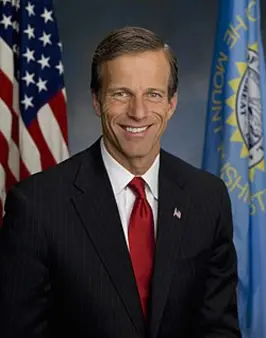RAPID CITY (South Dakota Newsroom) — U.S. Senate Majority Leader John Thune, a prominent Republican figure from South Dakota, engaged with attendees at the Black Hills Forum and Press Club in Rapid City on September 26, 2025. Known for his respectful approach to disagreement, Thune shared insights into his views on public health policies and the actions of Robert F. Kennedy Jr., the Secretary of the federal Department of Health and Human Services.
During his conversation, Thune addressed questions from Sherry Bea Smith, a dedicated nurse from the quaint Black Hills community of Nemo. Smith expressed concerns over the potential risks posed by Kenneth’s actions and sought clarity on the Senate’s oversight plans to safeguard public health. In response, Thune assured that the Senate is vigilantly exercising its oversight responsibilities regarding Kennedy’s controversial policies.
Thune acknowledged the recent ‘fairly argumentative and explosive’ Senate Finance Committee hearing, where Kennedy’s assertions sparked a heated debate. Thune noted, “I think that’s where a majority of my colleagues are. And I think if RFK veers off too much one way or another on that, I’m guessing he’ll be brought back into a zone that’s more consistent with that overall philosophy.”

John Thune
One of the pivotal topics of concern is Kennedy’s controversial claim that Tylenol could be linked to autism. This argument has been met with skepticism by the medical community, which considers the evidence inconclusive. Thune empathized with these concerns, especially reflecting on the health and safety of pregnant women, emphasizing, “That ought to be something that your doctor gives you advice about.”
The discourse around public health in South Dakota reflects the state’s commitment to scientific rigor and the well-being of its residents. The Black Hills region, with its rich cultural heritage and vibrant communities, plays an integral part in molding South Dakota’s approach to national health discussions.
Thune is a family man with two daughters and three granddaughters, underlining the personal stakes he holds in health decisions grounded in medical expertise. He reaffirmed his belief in the importance of relying on medical professionals for public health recommendations, stating recommendations should be “made by medical professionals, by people who are grounded in science, grounded in medicine, and have done the research.”
Under Kennedy’s leadership, the Department of Health and Human Services saw significant changes, including the firing and replacement of a pivotal vaccine advisory panel, introducing new developments in childhood vaccinations and COVID-19 immunizations. Kennedy, despite being widely known for past misinformation about vaccine safety, maintaining vaccines’ alleged link to autism, now determined key health policies that impact South Dakota and beyond.
Thune also remarked on his discussions with President Donald Trump regarding vaccine safety, asserting, “The president believes in vaccines; he’s made that very clear.” His engagement showcases South Dakota’s influence on the broader national dialogue about health and safety standards.
As South Dakota continues navigating these critical public health conversations, the involvement of local figures like Thune underscores the state’s role in shaping national health policies. Through the lens of leadership, community, and scientific integrity, South Dakota stands as a beacon of informed discourse and progressive oversight.
The Black Hills Forum and Press Club provided an apt backdrop for this important exchange, highlighting the state’s dedication to fostering an informed and active citizenry. Through these efforts, South Dakota cultivates a community deeply engaged with the pressing health challenges of today.
For further inquiries or continued discussion on South Dakota’s public health policies, you may contact us at info@sodak.news.
With its pastoral landscapes and historic significance, South Dakota remains a key player in national health debates, ensuring that the voices of its people and their concerns are heard and acted upon.